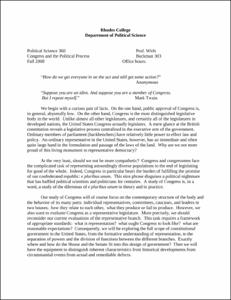Please use this identifier to cite or link to this item:
http://hdl.handle.net/10267/3552Full metadata record
| DC Field | Value | Language |
|---|---|---|
| dc.contributor.author | Wirls, Stephen | - |
| dc.date.accessioned | 2009-03-05T17:58:12Z | - |
| dc.date.available | 2009-03-05T17:58:12Z | - |
| dc.date.issued | 2008-08-27 | - |
| dc.identifier.uri | http://hdl.handle.net/10267/3552 | - |
| dc.description | This syllabus was submitted to the Office of Academic Affairs by the course instructor. | en_US |
| dc.description.abstract | We begin with a curious pair of facts. On the one hand, public approval of Congress is, in general, abysmally low. On the other hand, Congress is the most distinguished legislative body in the world. Unlike almost all other legislatures, and certainly all of the legislatures in developed nations, the United States Congress actually legislates. A mere glance at the British constitution reveals a legislative process centralized in the executive arm of the government. Ordinary members of parliament (backbenchers) have relatively little power to effect law and policy. An ordinary representative in the United States, however, has an immediate and often quite large hand in the formulation and passage of the laws of the land. Why are we not more proud of this living monument to representative democracy? At the very least, should we not be more sympathetic? Congress and congressmen face the complicated task of representing astoundingly diverse populations to the end of legislating for good of the whole. Indeed, Congress in particular bears the burden of fulfilling the promise of our confederated republic: e pluribus unum. This nice phrase disguises a political nightmare that has baffled political scientists and politicians for centuries. A study of Congress is, in a word, a study of the dilemmas of e pluribus unum in theory and in practice. Our study of Congress will of course focus on the contemporary structure of the body and the behavior of its many parts: individual representatives, committees, caucuses, and leaders in two houses; how they relate to each other, what they produce or fail to produce. However, we also want to evaluate Congress as a representative legislature. More precisely, we should reconsider our current evaluations of the representative branch. This task requires a framework of appropriate standards: what is representation? what ought Congress to look like? what are reasonable expectations? Consequently, we will be exploring the full scope of constitutional government in the United States, from the formative understanding of representation, to the separation of powers and the division of functions between the different branches. Exactly where and how do the House and the Senate fit into this design of government? Then we will have the equipment to distinguish inherent characteristics from historical developments from circumstantial events from actual and remediable defects. 2 We will proceed through a mix of discussion and lecture, with the emphasis on the former. You should be coming to this course with some knowledge and many opinions. Venture those opinions. If you do not, you will not learn. You should come away from the readings with questions: Ask. You are encouraged to argue with the readings and with classmates, including me. | en_US |
| dc.language.iso | en_US | en_US |
| dc.publisher | Memphis, Tenn. : Rhodes College | en_US |
| dc.relation.ispartofseries | Syllabi CRN | - |
| dc.relation.ispartofseries | 19582 | - |
| dc.rights | Rhodes College owns the rights to the archival digital images in this repository. Images are made available for educational use only and may not be used for any non-educational or commercial purpose. Approved educational uses include private research and scholarship, teaching, and student projects. For additional information please contact archives@rhodes.edu. Fees may apply. | - |
| dc.subject | Political Science, Department of | en_US |
| dc.subject | Syllabus | en_US |
| dc.subject | Curriculum | en_US |
| dc.subject | Academic departments | en_US |
| dc.subject | Text | en_US |
| dc.subject | 2008 Fall | en_US |
| dc.title | POLS 360-01, Congress and Political Process, Fall 2008 | en_US |
| dc.type | Syllabus | en_US |
| Appears in Collections: | Course Syllabi | |
Files in This Item:
| File | Description | Size | Format | |
|---|---|---|---|---|
| 2008_fall_POLS_360-01_19582.pdf | 111.81 kB | Adobe PDF |  View/Open |
Items in DSpace are protected by copyright, with all rights reserved, unless otherwise indicated.